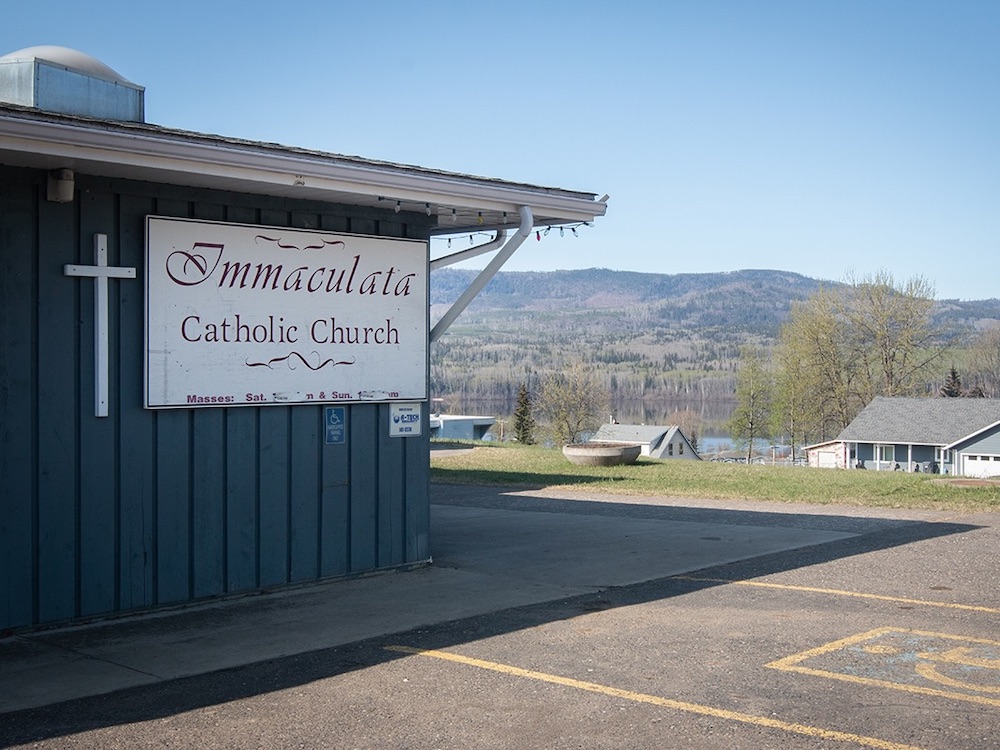[Editor’s note: This article contains stories about trauma and abuse. It may be triggering to some readers.]
As the RCMP began looking into an allegation of historical sexual assault at Immaculata Elementary School in Burns Lake, the number of witnesses stepping forward to share their stories of abuse prompted the police to split its work, assigning two officers to conduct a broader investigation into the school.
“It was decided that we’d create a separate file to have people talk about their general experience at the school and the allegations of abuse,” Sgt. Quinton Mackie, who was at the time a corporal with the RCMP in Prince George, testified Wednesday at a Canadian Human Rights Tribunal inquiry reviewing the investigation.
But both officers who took over the spin-off investigation, Const. Rachel Cox and Const. Andrea Hanley, have now been removed from the list of RCMP witnesses set to testify at the six-week inquiry, which wraps up next week, according to an updated schedule. Five other people have also been removed from the RCMP’s witness list.
The tribunal, which follows a human rights complaint made by six members of the Lake Babine Nation in 2016, is examining whether Canada’s national police force discriminated against Indigenous survivors of the Burns Lake day school and Prince George College when it conducted its investigation a decade ago.
The RCMP began investigating after Beverly Abraham, a member of the Lake Babine Nation, brought her story of historic sexual assault to the Burns Lake detachment in July 2012. She said that a former physical education teacher at the school had abused her in the late 1960s when she was about 11 years old. The teacher would later move on to Prince George College in the early 1970s.
The man, whose identity is protected by a publication ban and who is referred to in tribunal documents as A.B., had since risen to prominence. Two days after Abraham’s complaint, senior officers circulated an internal briefing note that described him as a “well-known Canadian” and noted that the matter “will likely be linked to the greater issue of First Nations and Native Residential Schools.”
“Given the public status of [A.B.], this will garner significant media attention,” the internal briefing note said, adding the allegations could “prove to be an embarrassment at a number of levels of government.”
Eighteen months later, RCMP concluded there were insufficient grounds to recommend charges against A.B., based on a lack of corroborating evidence. An investigation report showed that nearly two dozen witnesses — one who alleged she was “groped” by A.B. while attending Prince George College — were shuffled to the secondary file.
Karen Bellehumeur, lawyer for the complainants, expressed frustration on Wednesday that the other officers were not available to testify. Mackie, who conducted the sexual assault investigation and oversaw the secondary investigation, said he couldn’t speak about the separate investigation or why witnesses who had spoken publicly about abuse were not contacted.
“I can't speak for them,” Mackie said.
“Well, you’re their supervisor and neither of them are testifying,” Bellehumeur responded. “Wouldn't you be making sure that they did all the things that you're supposed to do in their investigation?”
Bellehumeur continued to press Mackie, asking, “If you can’t speak to it who can speak to it? They’re apparently not able to come. Is there somebody else that can speak to it?”
Mackie suggested Staff Sgt. Geoff Parks, his direct supervisor who signed off on the final investigation report. Parks has also been taken off the witness list, Bellehumeur responded.
Based on an updated schedule provided by the Canadian Human Rights Tribunal yesterday, an additional four RCMP witnesses have also been removed from the list. One, a unit commander with the North District general investigations section, has been added to the list since the hearings began May 1.
Canada’s Department of Justice, which is representing the RCMP at the inquiry, did not respond to The Tyee’s questions about these changes before publication.
Neither the sexual assault nor the spinoff investigations resulted in charge recommendations being referred to Crown counsel.
A May 2014 investigation report completed by Const. Andrea Hanley, who was initially on the RCMP’s witness list but has since been removed, concluded that the stories of 21 witnesses who were interviewed “lacked one or more sufficient details including offence times, suspect identification or a victim in order to substantiate a criminal charge.”
While most former students described corporal punishment that was legally permitted until 1973, Hanley wrote, several provided examples of assault and abuse that was “over and above corporal punishment.”
The former students’ allegations included being deliberately locked out of the school in -35 C weather. They said they were strapped and kicked and had their hair pulled, and that they were hit with a heavy ruler with nails driven through it. This abuse was meted out after, for example, they spoke their Indigenous language. Some witnesses described sexual abuse at the school, according to the report.
A June 2020 statement of particulars filed by the Lake Babine complainants alleges that the RCMP investigators’ “stereotypes and biased attitudes” resulted in a flawed investigation into the abuse.
While the claim is specific to experiences of childhood abuse in northern B.C., “it represents the experiences of many other Indigenous people nationwide,” the statement of particulars says, demonstrating how “the protection of powerful individuals serves to exacerbate the discrimination of oppressed groups.”
In addition to an apology from the RCMP and $40,000 for each person impacted by abuse at Immaculata Elementary School and Prince George College, the complainants are asking that the RCMP divest itself of abuse investigations in Indigenous communities, instead replacing them with an independent group that includes at least one community member. In lieu of counselling, they seek funds to build a healing centre in their community.
The hearings are scheduled to continue until June 22. ![]()
Read more: Indigenous, Rights + Justice


















Tyee Commenting Guidelines
Comments that violate guidelines risk being deleted, and violations may result in a temporary or permanent user ban. Maintain the spirit of good conversation to stay in the discussion and be patient with moderators. Comments are reviewed regularly but not in real time.
Do:
Do not: